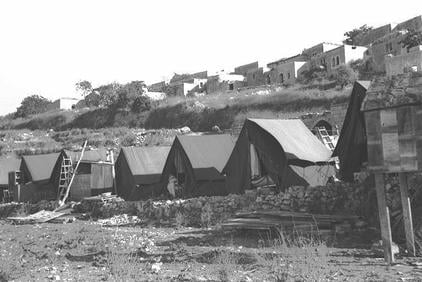Palestinians reunite after five decades
JURDEIKH, May 31: Weeping tears of joy, 110-year-old Saleh Hashem clutched the barbed wire border fence on Wednesday and shouted greetings to his sister and brother on the Lebanese side of the Israeli frontier.
Their last reunion was half a century ago. "Thank you to Israel for letting me see my brothers before I die," Hashem cried out, a week after Israeli troops made their lightning withdrawal from the south Lebanon occupation zone.
"Hello, my brother," Hashem's sister, Najibe, shouted back.
Palestinians like Hashem have been flocking to the border fence between Israel and Lebanon to meet family members they haven't seen in decades.
Weeping and holding hands across the tangled barbed wire, they hold small children on their shoulders so that their aunts, uncles, cousins and grandparents in Lebanon could see them in person for the first time.
Hashem and his brothers and sisters fled their home town of Suhmata, in the Galilee, shortly after Israel was established in 1948.
Hashem moved to Maalot Tarshiha, Israel, not far from where his village used to be. His siblings went to Rashidiyeh, Lebanon. They spoke on the telephone and exchanged letters and pictures over the years, but never saw each other.
The United Nations estimates there are now 365,000 Palestinian refugees living in Lebanon.
"Yesterday I called at eleven at night and told them that we could come to the...fence," Hashem's grandson, Ahmed Said Mahmoud said, making sure the excited old man stayed seated and kept his head under a blanket for shade.
Metres away on the Lebanese side of the border, Hashem's nieces and nephews lined up, the women crying into handkerchiefs and throwing candy bars and packets of cookies.
Skinny legs shaking under his white robe, Hashem lifted his wrinkled face and in a quivering voice said in Arabic: "I am 110 years old...I hope there will be peace."
Ibtisam Mustapha Bushnak covered her face with her hands and cried, unable to describe how it felt to see her parents and brothers.
"My mother, I haven't seen her in 11 years, 11 years," she said. Her brown eyes filled with tears as an Israeli soldier trying to control the emotional crowd asked her to step back from the fence.
Bushnak's family also fled to Lebanon in 1948 and she and her brothers and sisters were born there. She later moved to Israel to get married.
Holding her two-year-old son in her arms, Bushnak watched as the men from Shfaram, Israel, where she now lives, threw watermelons over the fence, then boxes of ice cream, bags of ice cream cones and a cooler.
Later, Bushnak waited with about 40 members of her family and friends for her 70-year-old father to be carried up the two-km mountain path to the fence.
Sitting in front of the fence in a plastic chair, Mustapha Darweesh lowered his head and cried, barely able to speak.
Nearby, Hassan Awali of Ebilin, a town near Shfaram, stood on the dusty border staring at his 36-year-old nephew, whom he was seeing for the first time.
"We never saw them, we didn't know their colour, we didn't know their size," Awali said, tears in his eyes, as his nephew held up a three-month-old child.-Reuters




Post Your Comment
*It should be NOTED that your email address won't be shared, and all communications between members will be routed via the website's mail server.